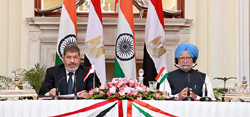 Marking a transforming moment in their bilateral ties, India and a newly-democratic Egypt, one of the Arab world’s key powers, have decided to impart greater economic and strategic heft to their engagement by signing a clutch of pacts to seal a knowledge-driven partnership.
Marking a transforming moment in their bilateral ties, India and a newly-democratic Egypt, one of the Arab world’s key powers, have decided to impart greater economic and strategic heft to their engagement by signing a clutch of pacts to seal a knowledge-driven partnership.
Amid the flux in the Arab world, the two countries also outlined a global vision of their relationship by agreeing to enhance defence relations and closer consultations on international issues ranging from global trade talks to the UN, Non-Aligned Movement and festering crises like Syria.
Indian Prime Minister Manmohan Singh and Egyptian President Mohamed Morsy, who is on his maiden visit to India, held wide-ranging talks to push the envelope for the relationship that had languished under the previous regime in Cairo. It’s a confluence of new visions and priorities that has brought Asia’s third largest economy and the Arab world’s key power together, with the leaders of both countries robustly reaffirming their will to scale up relations to new heights.
The seven pacts which were inked at the stately Hyderabad House in the heart of the Indian capital March 19 reflected the contours of a win-win partnership which is going to be driven by knowledge, innovation and creativity in a rapidly changing world.
These pacts encompassed areas, including cyber security, IT, protection of intellectual property rights and the prevention of illicit traffic of antiquities.
The Egyptian president acknowledged India’s emergence as a knowledge power and sought closer partnership in training and capacity building – critical tools of transformation in the two countries with the burgeoning population of the young and the enterprising.
India has agreed to set up a Centre for Excellence in IT (CEIT) in Egypt’s Al Azhar University. The pacts envisaged closer cooperation in a cluster of core areas which have the potential to transform the lives of people in both countries. These included, among others, e-governance and e-education, IT and electronics hardware, sharing of experiences in the creation of Technology Parks and IT clusters, and strengthening the cooperation between ICT companies in the private sector.
Capturing the spirit of transformation in India-Egypt relations, Manmohan Singh said: “We agreed that his visit, at an important juncture for Egypt, offers us a great opportunity to renew our relationship and take it to a different level of engagement and cooperation.”
The democratisation of Egypt in the aftermath of the Arab spring nearly two years ago has unleashed new possibilities in the bilateral relationship that remains underleveraged. In this context, Manmohan Singh’s strong support for institution-building in Egypt should be cheered by those who care for democracy in the region.
The Indian prime minister said India was willing to share its experience as President Morsy “ably leads his nation in building strong institutions and frameworks for democracy, social justice and inclusive economic development.” “I am convinced that Egypt’s successful transition would be an important model for the region and the world,” he said.
Egypt also raised the bar by pushing India to join the Suez Canal corridor project that seeks to act as a bridge connecting Africa with Asia. The corridor project would make Egypt a hub for India’s exports to the West and boost Indian exports to $200 billion, an upbeat Egyptian president said after the talks.
The economic partnership has “rich possibilities,” Manmohan Singh said. “We agreed that information technology, services, electronics, small and medium enterprises, manufacturing, fertilisers, and renewable energy constitute important areas of cooperation.”
“Egypt’s location, as a bridge between Asia and Africa, bestrides a major global trade route and together with its skilled human resources makes it an attractive business destination for India,” he said. The sentiment is shared by globally ambitious Indian companies which are planning to scale up investment in the country, better known for its historical riches, including pyramids and the legendary Queen Cleopatra.
Around 45 Indian companies have already invested over $2.5 billion in projects in Egypt. In fact, Indian companies have shown their confidence in the country’s long term potential by staying put right through the post-revolution period.
“Fresh Indian projects have been launched since the Jan 25 revolution in sectors like petrochemicals, pharmaceuticals, readymade garments and education,” says India’s ambassador to Egypt Navdeep Suri.
Underlining the importance of the Egyptian president’s visit to India, Chinmaya Gharekhan, a former special envoy of the Indian prime minister to West Asia, wrote in The Hindu: He “is visiting us despite being besieged by many extremely difficult challenges — raging riots, rapidly degrading economy, massive unemployment, and, above all, the clamour for reform, protection for the rights of minorities and women, to scrap the Constitution and, even to abdicate office. India should make a note of this and welcome his visit.”
India Writes Network
Author Profile

- Manish Chand is Founder and Editor-in-Chief of India Writes Network (www.indiawrites.org) and India and World, a pioneering magazine focused on international affairs. He is CEO, Centre for Global India Insights, an India-based think tank focused on global affairs.
Latest entries
 India and the WorldFebruary 27, 2026Modi visit: India-Israel partnership enters a new era
India and the WorldFebruary 27, 2026Modi visit: India-Israel partnership enters a new era India and the WorldFebruary 24, 2026Unravelling Modi’s Israel journey: What to expect
India and the WorldFebruary 24, 2026Unravelling Modi’s Israel journey: What to expect India and the WorldFebruary 17, 2026South-by-South: Focus on people-centric solutions at India AI summit
India and the WorldFebruary 17, 2026South-by-South: Focus on people-centric solutions at India AI summit India and the WorldFebruary 7, 2026Modi hails interim India-US trade deal, Goyal says no concessions made on agriculture
India and the WorldFebruary 7, 2026Modi hails interim India-US trade deal, Goyal says no concessions made on agriculture







